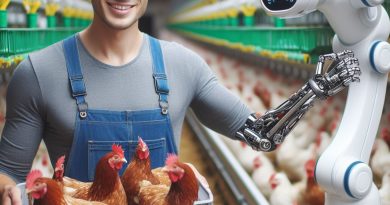Swine Diets Decoded: What Your Pigs Need
Last Updated on March 2, 2024
Introduction
Swine diets refer to the nutritional plans designed for the optimal health and growth of domestic pigs.
These diets are crucial in sustaining the physiological requirements of swine at different life stages, including gestation, lactation, and growth phases.
Swine nutrition involves a balance of essential nutrients such as proteins, carbohydrates, vitamins, and minerals to meet the specific needs of pigs, enhance reproductive performance, and achieve desirable carcass quality.
Formulating swine diets requires consideration of factors like genetics, environment, and production goals.
Modern swine production employs scientific approaches to tailor diets, aiming for efficient growth, feed conversion, and overall herd well-being.
Understanding the specific nutritional needs of pigs is essential for their well-being and success.
Pigs require a balanced diet that provides essential nutrients like protein, carbohydrates, vitamins, and minerals.
Meeting these dietary requirements promotes proper muscle development, reproductive success, and overall well-being.
Efficient pig nutrition also enhances feed conversion rates, minimizing production costs for farmers.
Additionally, a well-designed diet reduces environmental impact by minimizing waste and nutrient runoff.
Ultimately, a comprehensive understanding of pig nutrition is essential for sustainable and profitable pig farming, ensuring both animal welfare and economic viability in the agricultural industry.
Nutritional requirements for swine
Discussion of the different nutrients essential for pigs
- Protein: Pigs need protein for growth, development, and maintenance of body tissues.
- Carbohydrates: Carbs are a vital energy source to support daily activities and body functions.
- Fats and oils: These provide concentrated energy, aid absorption of fat-soluble vitamins, and improve palatability.
- Vitamins and minerals: Essential for overall health, these nutrients play various roles in metabolism and immunity.
Highlighted significance of each nutrient in pig diet
1. Protein
Protein is crucial for swine as it provides amino acids needed for tissue growth and repair. It is especially important during the production stage, when pigs are rapidly growing.
This nutrient helps them develop strong muscles, bones, and organs. Without adequate protein, pigs may suffer from stunted growth, weak immune systems, and reduced production efficiency.
2. Carbohydrates
Pigs require carbohydrates as a primary source of energy for daily activities, such as walking, playing, and temperature regulation.
Carbs are quickly metabolized into glucose, which fuels the body’s cells. A lack of carbohydrates in a pig’s diet can lead to fatigue, decreased productivity, and poor growth.
3. Fats and oils
Fats and oils are essential in pig diets as they provide concentrated energy, allowing for efficient weight gain.
They also enhance the taste and palatability of feed, encouraging pigs to consume an adequate amount of nutrients.
Including the right amount of fats and oils in a pig’s diet is crucial, as excessive or imbalanced levels can lead to obesity or nutrient deficiencies.
4. Vitamins and minerals
Vitamins and minerals are vital for swine health and metabolic processes. They play specific roles in immune function, digestion, bone development, and overall well-being.
Pigs need a wide range of vitamins, including A, D, E, and various B vitamins. Important minerals include calcium, phosphorus, iron, and zinc.
Deficiencies in these nutrients can cause various health issues, such as poor bone density, weakened immunity, and reproductive problems.
Ensuring pigs receive the proper balance of these nutrients in their diet is crucial for their health and productivity.
Each nutrient has unique functions and requirements, necessitating careful formulation of swine feed.
Nutritionists work to develop diets that meet specific age, production, and breed requirements, taking into account the nutrient needs of pigs at different stages of life.
By providing a well-balanced diet rich in protein, carbohydrates, fats and oils, vitamins, and minerals, pig producers can optimize growth, reproduction, and overall performance.
It is essential to regularly assess and adjust the nutrient composition of pig diets to meet changing requirements and utilize the latest advancements in swine nutrition research.
Essentially, understanding the nutritional requirements of pigs is key to providing them with a healthy and balanced diet.
The right mix of protein, carbohydrates, fats and oils, vitamins, and minerals ensures optimal growth, production, and overall well-being for swine.
Careful attention to their individual needs at different stages of life leads to healthier and more productive pigs.
Understanding the stages of pig growth
Explanation of the different growth stages of pigs
- Pre-starter stage: This is the stage where piglets are weaned and transitioned from sow’s milk to solid feed.
- Starter stage: Pigs are introduced to a diet that promotes growth and supports their digestive system.
- Grower stage: In this stage, pigs continue to develop and require a balanced nutritional diet to ensure healthy growth.
- Finisher stage: Pigs are almost fully grown, and the focus is on providing a diet that optimizes muscle development and carcass quality.
Discussion of how nutritional needs vary at each growth stage
Understanding the nutritional needs of pigs at different growth stages is essential for proper pig farming.
Each stage requires specific dietary adjustments to support the pig’s growth and overall health.
1. Pre-starter stage
During the pre-starter stage, piglets are transitioning from sow’s milk to solid feed. They have high protein and energy requirements to support rapid growth and development.
The diet typically consists of highly digestible ingredients like milk replacers, soybean meal, and corn. Feeds may also include probiotics and additives to enhance gut health.
2. Starter stage
When pigs reach the starter stage, their digestive system becomes more mature, and they can consume a wider range of ingredients.
The diet focuses on promoting growth while avoiding digestive issues. The feed contains high levels of protein, essential amino acids, and easily digestible carbohydrates.
Vitamins and minerals that support bone development, immunity, and overall health are also added.
3. Grower stage
In the grower stage, pigs continue to grow and develop muscle and bone. The nutritional requirements shift towards providing a balanced diet that helps them reach their full potential.
The feed contains a moderate level of protein, energy, and essential nutrients. The inclusion of fiber and roughage also improves gut health and reduces the risk of digestive disorders.
4. Finisher stage
During the finisher stage, pigs are close to reaching their market weight. The diet aims to optimize muscle development, carcass quality, and fat deposition.
The feed contains an adequate level of protein to support muscle growth and a controlled level of energy to prevent excessive fat accumulation.
Nutrients like vitamins, minerals, and antioxidants are also maintained to support overall health and meat quality.
It is important for pig farmers to work closely with nutritionists and veterinarians to ensure that pigs receive the appropriate nutrition at each growth stage.
Proper nutrition leads to healthier pigs, optimal growth rates, and improved meat quality. By providing the right diet, farmers can maximize profitability and ensure the well-being of their swine herd.
Common swine feed ingredients
common feed ingredients used in swine diets
- Corn: A primary ingredient in swine diets, corn is high in energy and provides essential nutrients.
- Soybean meal: A good source of protein, soybean meal enhances muscle development and overall growth.
- Wheat: Another energy-rich ingredient, wheat is often used in swine diets for its high carbohydrate content.
- Barley: Barley is an excellent source of fiber and offers a sustainable energy source for swine.
- By-products (e.g., distillers grains, canola meal): By-products are often added to swine diets to provide additional nutrients and energy.
Discussion of the benefits and considerations of each ingredient
Corn:
- Benefits: Corn is highly digestible for pigs and offers a balanced mix of nutrients essential for growth.
- Considerations: Corn prices can fluctuate, affecting the overall cost of swine feed.
Soybean meal
- Benefits: Soybean meal has a high protein content, contributing to muscle development and growth in swine.
- Considerations: Allergies to soy may exist in some pigs, requiring alternative protein sources.
Wheat
- Benefits: Wheat is an excellent source of energy, promoting weight gain and overall health in swine.
- Considerations: Wheat may contain anti-nutritional factors that could hinder the absorption of certain nutrients.
Barley
- Benefits: Barley provides dietary fiber, promoting gut health and aiding in digestion for swine.
- Considerations: Barley has a lower energy content compared to other grains, requiring careful balancing in the diet.
By-products (e.g., distillers grains, canola meal)
- Benefits: By-products are cost-effective alternatives that can contribute to the nutritional value of swine diets.
- Considerations: Quality and consistency can vary among different by-products, requiring careful selection and monitoring.
In fact, understanding the common feed ingredients used in swine diets is crucial for optimizing pig nutrition and overall health.
Corn, soybean meal, wheat, barley, and various by-products offer specific benefits and considerations.
Balancing these ingredients and considering factors such as price, allergies, nutrient content, and consistency can help farmers provide their pigs with well-rounded diets.
By continually evaluating and adjusting feed ingredients, farmers can ensure optimal growth and performance in their swine herds.
Read: Llama & Alpaca: Preventive Health Tips

Feed formulation for optimal pig health and growth
Feeding pigs with a proper diet is crucial for their health and growth.
The process of formulating feed involves carefully balancing the nutrient requirements of the pigs and the availability of different ingredients.
This ensures that the pigs receive all the necessary nutrients to thrive.
Explanation of the process of feed formulation
1. Balancing nutrient requirements and ingredient availability
In feed formulation, nutritionists carefully analyze the nutrient requirements of pigs at different stages of growth.
They take into account the essential nutrients such as carbohydrates, proteins, fats, vitamins, and minerals required by the pigs.
They also consider the availability and cost of various feed ingredients in order to create a well-balanced and cost-effective diet.
2. Considering pig’s age, weight, and health status
Pigs have different nutritional needs depending on their age, weight, and health status.
For instance, young pigs require higher levels of protein and energy for proper growth, while lactating sows need diets with increased energy levels to support milk production.
Individual pigs with specific health conditions may also require customized diets to address their specific needs and promote their recovery.
Discussion of the importance of customized diets for different pig farms
Customizing diets for different pig farms is important due to variations in farm management practices, genetic strains, and environmental conditions.
Each farm has unique goals, whether it is to maximize growth rate, optimize feed conversion, or enhance meat quality.
Therefore, formulating diets that are tailored to the specific requirements of each farm can help achieve these goals more effectively.
For example, a farm focused on producing lean hogs may require diets with lower-fat content, while another farm specializing in breeding might require specific diets to support reproductive performance.
Customized diets can also help address specific challenges faced by pig farms, such as feed availability, climate conditions, or disease management.
In general, feed formulation plays a crucial role in optimizing pig health and growth.
By carefully balancing nutrient requirements and ingredient availability, nutritionists can develop diets that meet the specific needs of pigs at different stages of growth.
Customized diets further contribute to the success of pig farms by addressing their unique goals and challenges.
Overall, a well-formulated feed is essential for ensuring the health, welfare, and productivity of pigs in different farming systems.
Read: Automated Watering Systems: A Game Changer
Learn More: Boost Your Beef Cattle’s Health: Top Tips
Specialty diets for specific pig needs
Explore specialized diets for breeding pigs
- Breeding pigs have specific nutritional requirements to support reproductive functions.
- These diets should contain a balanced mix of proteins, carbohydrates, vitamins, and minerals.
- The diets should provide sufficient energy for successful mating and healthy conception.
- Supplements such as folic acid, vitamin E, and selenium can benefit breeding pigs.
- It is crucial to consult with a veterinarian to design the most suitable diet for breeding pigs.
Discussion of diets for show pigs or exhibition pigs
- Show pigs require special diets to enhance their growth, appearance, and overall health.
- These diets focus on a higher protein content to develop muscle strength and definition.
- The inclusion of amino acids, especially lysine and methionine, is important for muscle growth.
- Fibrous and bulky feeds are avoided to prevent excessive fat deposition and maintain a lean body.
- Show pigs also benefit from vitamin and mineral supplements to promote coat shine and skin health.
Highlighted importance of veterinarian guidance for special diets
- Veterinarians play a crucial role in designing and monitoring specialty diets for specific pig needs.
- They possess the expertise to assess the individual pig’s requirements and make appropriate recommendations.
- Veterinarians ensure that the diet meets all nutritional needs while aligning with the pig’s health status.
- They monitor the pig’s response to the diet and make adjustments as necessary to optimize results.
- Regular check-ups with a veterinarian are vital to ensure the pig’s health and dietary needs are met.
Read: Beekeeping Health: Hive Disease Prevention
How to evaluate the success of a swine diet
Evaluating the success of a swine diet is crucial to ensure the optimal health and performance of the pigs.
Here are some indicators that can help determine if a swine diet is well-balanced.
Indicators of a well-balanced diet
1. Healthy growth and body condition
The primary goal of any swine diet is to promote healthy growth and maintain ideal body condition.
Pigs should exhibit consistent growth rates without experiencing stunted or excessive body weight gain.
A balanced diet should support the pig’s overall development and ensure they reach their genetic potential.
2. Proper feed intake and conversion rates
Swine diets should provide adequate nutrients to meet the pig’s energy and protein requirements.
Monitoring feed intake is essential to ensure pigs are consuming the appropriate amount of feed for their age and size.
Additionally, assessing feed conversion rates, which measures the amount of feed needed for a pig to gain a certain amount of weight, helps determine diet efficiency.
3. Minimal health issues or deficiencies
A well-balanced diet should minimize health issues and prevent nutritional deficiencies in pigs.
Regular monitoring of the pigs’ overall health, including the appearance of their coat, skin, and eyes, can indicate if the diet is providing the necessary nutrients.
Swine diets should also consider the specific nutritional needs of the pig based on its life stage, such as weaning, growing, or finishing.
Advise on monitoring and adjusting diets as needed
To ensure the success of a swine diet, it is essential to monitor and adjust the diet as needed.
Monitoring
Regularly assessing the indicators mentioned above is crucial in evaluating the effectiveness of the swine diet.
Keep track of the pigs’ growth rate, body condition, feed intake, and conversion rates. Record any health issues or deficiencies observed.
Adjusting
If any indicators reveal an imbalance or inadequacy in the swine diet, adjustments should be made promptly.
Consult with a swine nutritionist or veterinarian to determine the specific changes required.
This may involve altering the proportions of different feed ingredients, adjusting nutrient levels, or adding supplements to correct deficiencies.
It is important to note that dietary adjustments should be made gradually to allow the pigs’ digestive system to adapt.
Sudden changes may lead to digestive upsets or refusal to consume the modified diet. Ensure a proper transition period when implementing diet adjustments.
Regularly re-evaluate the success of the swine diet and make necessary adjustments as the pigs grow and their nutritional needs change.
Monitoring and adapting the diet as needed will contribute to the overall health, performance, and profitability of the swine operation.
Read: Rabbit Care: Preventing Common Ailments
Conclusion
Understanding swine diets is crucial for the health and well-being of your pigs.Tailoring diets to meet nutritional needs enhances growth, reproduction, and overall health.
Balanced nutrition ensures optimal weight gain, reduces feed costs, and minimizes environmental impact. Swine diets must consider factors like age, weight, genetics, and production goals.
Proper nutrition also mitigates health issues, improving disease resistance and reducing the need for antibiotics.
Moreover, it enhances feed conversion efficiency, translating to better resource utilization and sustainability.
A nuanced understanding of swine diets is fundamental for achieving economic viability, animal welfare, and sustainable swine farming practices.
Make sure to prioritize your pigs’ nutritional needs to ensure their optimal growth and development.
There are various resources available for further learning about swine nutrition, such as books, websites, and experts in the field.
There are various resources available for further learning about swine nutrition, such as books, websites, and experts in the field.


